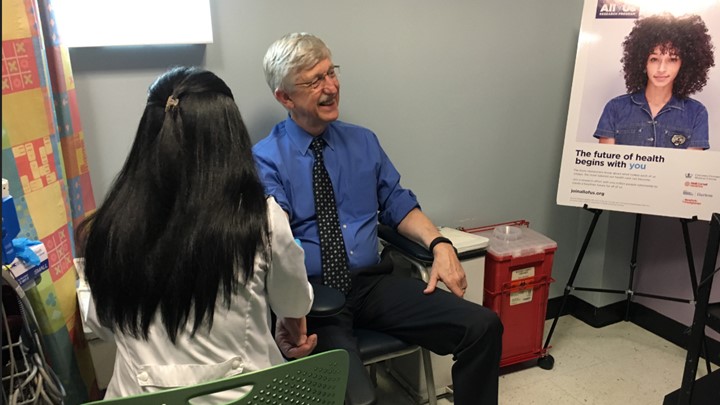All of Us Research Program
All of Us: Eric Dishman’s Story
Posted on by Dr. Francis Collins
At age 19, Eric Dishman was diagnosed with a rare form of kidney cancer. The prognosis: nine months to live. Thanks to early access to pioneering research in precision medicine, which clarified the best treatment plan for him, Eric is alive and well almost 25 years later. As you’ll learn in this video, Eric now directs NIH’s All of Us Research Program, which is enrolling 1 million or more Americans to build the foundation for the future of precision medicine.
If you’d like to volunteer for this landmark effort, go to the All of Us website, click the “Join Now” button, and follow the three easy steps. First, create an account. It’s free and takes just a minute or two. Next, complete the enrollment and consent forms. That usually takes 30 minutes or less. Then, complete some baseline surveys and find out what to do next. Thank you!
All of Us: Importance of Diversity
Posted on by Dr. Francis Collins
Medical research hasn’t always fully represented our nation’s rich diversity. As the video above shows, NIH’s All of Us Research Program is committed to doing things differently by enrolling individuals of many different races, ethnicities, and walks of life. The more we know about what makes each person unique, the more customized health care can become.
Want to be part of this pioneering effort? Go to the All of Us website, click the “Join Now” button, and follow the three easy steps. First, create an account. It’s free and takes just a minute or two. Next, complete the enrollment and consent forms. That usually takes 30 minutes or less. Then, complete some baseline surveys and find out what to do next. Thank you!
All of Us: We are America’s Veterans
Posted on by Dr. Francis Collins
Our men and women in uniform serve heroically to protect our freedom. While helping us, they learn to put greater good before their own personal gain. That’s why veterans have been among the first to sign up and take part in NIH’s All of Us Research Program. The video above shares a few of their stories.
If you are a veteran, thanks for your service! All of Us needs more great men and women—veterans and civilians alike—to help build the future of precision medicine. If you’d like to join the effort, go to the All of Us website, click the “Join Now” button, and follow the three easy steps. First, create an account. It’s free and takes just a minute or two. Next, complete the enrollment and consent forms. That usually takes 30 minutes or less. Then, complete some baseline surveys and find out what to do next. Thank you!
The All of Us Anthem
Posted on by Dr. Francis Collins
All of Us is more than just a medical research program. It’s a celebration of the American spirit in all its diversity and capacity to generate positive change. As this video states, “We are one nation, one people. When called upon to give from within, we come together.” Coming together 1 million people strong, we can build the foundation for a future of precision medicine.
Here’s how you can volunteer to help NIH to create this exciting future. Go to the All of Us website, click the “Join Now” button, and follow the three easy steps. First, create an account. It’s free and takes just a minute or two. Next, complete the enrollment and consent forms. That usually takes 30 minutes or less. Then, complete some baseline surveys and find out what to do next.
If you would like to learn more about NIH’s All of Us Research Program, join me and other leaders for a Twitter chat hosted by @NIH today at 1:00 pm ET. We’ll be providing information about the program and answering questions using #JoinAllofUs. Thank you!
Joining All of Us Research Program
Posted on by Dr. Francis Collins

Full enrollment for the All of Us Research Program began on May 6, 2018. Here, I’m providing a blood sample while enrolling in this exciting program to build a future of precision medicine. The photo was taken at the New York City Health + Hospitals/Harlem. Credit: NIH
Previous Page Next Page
